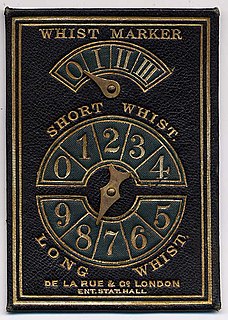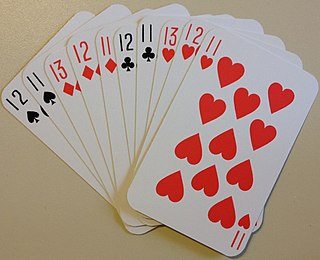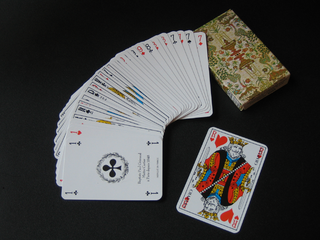
Pinochle, also called pinocle or penuchle, is a trick-taking, Ace-Ten card game typically for two to four players and played with a 48-card deck. It is derived from the card game bezique; players score points by trick-taking and also by forming combinations of cards into melds. It is thus considered part of a "trick-and-meld" category which also includes the game belote. Each hand is played in three phases: bidding, melds, and tricks. The standard game today is called "partnership auction pinochle".

Whist is a classic English trick-taking card game which was widely played in the 18th and 19th centuries. Although the rules are simple, there is scope for scientific play.

500 or five hundred, also called bid Euchre is a trick-taking game that is an extension of euchre with some ideas from bridge. For two to six players, it is most commonly played by four players in partnerships, but is sometimes recommended as a good three-player game. It arose in America before 1900 and was promoted by the United States Playing Card Company, which copyrighted and marketed the rules in 1904. 500 is a social card game and was highly popular in the United States until around 1920 when first auction bridge and then contract bridge drove it from favour. 500 continues to enjoy popularity in Ohio and Pennsylvania, where it has been taught through six generations community-wide, and in other countries: Australia, New Zealand, Canada (Quebec) and Shetland. The originator of Five Hundred, US Playing Card Company of Cincinnati, Ohio, now has headquarters across the Ohio River in Erlanger, Kentucky. Five hundred is promoted by some as the national card game of Australia.

Euchre or eucre is a trick-taking card game commonly played in Australia, Canada, New Zealand, Great Britain, and the United States. It is played with a deck of 24, 28, or 32 standard playing cards. Normally there are four players, two on each team, although there are variations that range from two to nine players.
Ninety-nine is a card game for 2, 3, or 4 players. It is a trick-taking game that can use ordinary French-suited cards. Ninety-nine was created in 1967 by David Parlett; his goal was to have a good 3-player trick-taking game with simple rules yet great room for strategy.

Forty-Fives is a trick-taking card game that originated in Ireland. The game is popular in many communities throughout Atlantic Canada as well as the Gaspé Coast in Québec. Forty-fives is also played in parts of Massachusetts and southern New Hampshire in New England, United States, as well as in the South Island of New Zealand.
Belote is a 32-card, trick-taking, Ace-Ten game played primarily in France and certain European countries, namely Armenia, Bulgaria, Croatia, Cyprus, Greece, Luxembourg, Moldova, North Macedonia and also in Saudi Arabia. It is one of the most popular card games in those countries, and the national card game of France, both casually and in gambling. It was invented around 1920 in France, and is a close relative of both Klaberjass and Klaverjas. Closely related games are played throughout the world. Definitive rules of the game were first published in 1921.
Romanian whist is a variant of whist which is similar to the English or American game Oh Hell! It is currently popular in Romania, and there it is simply called "whist".
The best chess-player in Christendom may be little more than the best player of chess; but proficiency in whist implies capacity for success in all these more important undertakings where mind struggles with mind. Edgar Allan Poe
Pedreaux is an American trick-taking card game of the All Fours family based on Auction Pitch. Its most popular variant is known as Cinch, Double Pedro or High Five. Developed in Denver, Colorado, in the 1880s, it was soon regarded as the most important member of the All Fours family. Although it went out of fashion with the rise of Auction Bridge, it is still widely played on the western coast of the United States and in its southern states, being the dominant game in some locations in Louisiana. Forms of the game have been reported from Nicaragua, the Azores, Italy and Finland. The game is primarily played by four players in fixed partnerships, but can also be played by 2–6 individual players.
Pitch is an American trick-taking card game derived from the English game of All Fours. Historically, Pitch started as "Blind All Fours", a very simple All Fours variant that is still played in England as a pub game. The modern game involving a bidding phase and setting back a party's score if the bid is not reached came up in the middle of the 19th century and is more precisely known as Auction Pitch or Setback. Whereas All Fours started as a two-player game, Pitch is most popular for three to five players. Four can play individually or in fixed partnerships, depending in part on regional preferences. Auction Pitch is played in numerous variations that vary the deck used, provide methods for improving players hands, or expand the scoring system. Some of these variants gave rise to a new game known as Pedro or Cinch.

Bid Euchre, Auction Euchre, Pepper or Hasenpfeffer, is the name given to a group of card games played in North America based on the game Euchre. It introduces an element of bidding in which the trump suit is decided by which player can bid to take the most tricks. The primary differences are the number of cards dealt, absence of any undealt cards, the bidding and scoring process, and the addition of a no trump declaration. It is typically a partnership game for four players, played with a 24, 32 or 36-card pack, or even two decks of 24 cards each. It should not be confused with another game also called Bid Euchre q.v. Five Hundred.
Sueca is a 4 player-partnership point trick-taking card game of the Ace-Ten family, and a popular variant of the Bisca card game. The game is played in Portugal, Brazil, Angola and other Portuguese communities. Its closest relative is the very similar German game Einwerfen.

Bluke or Blook is a trick-taking card game known to parts of the East Coast and the Midwest and possibly other parts of the United States of America. The game features use of the Jokers, which are sometimes referred to as the Blukes.

Napoleon or Nap is a straightforward trick-taking game in which players receive five cards each; whoever bids the highest number of tricks chooses trumps and tries to win at least their bidden number of tricks. It is a simplified relative of Euchre, and has many variations throughout Northern Europe. The game has been popular in England for many years, and has given the language a slang expression, "to go nap", meaning to take five of anything. It may be less popular now than it was, but it is still played in some parts of southern England and in Strathclyde. Despite its title and allusions, it is not recorded before the last third of the nineteenth century, and may have been first named after Napoleon III.
Smear is a North-American trick-taking card game of the All Fours group, and a variant of Pitch (Setback). Several slightly different versions are played in the Upper Peninsula of Michigan, Minnesota, Northern and Central Iowa, Wisconsin and also in Ontario, Canada.

Manille is a French trick-taking card game which uses a 32 card deck. It spread to the rest of France in the early 20th century, but was subsequently checked and reversed by the expansion of Belote. It is still popular in France and the western part of Belgium.
Pluck is a trick-taking playing card game for four players. The game is played similar to Spades and Hearts. A standard deck of playing cards is dealt out evenly among the players. The objective is to get ten points before the other team.
Rage is a 1983 trick-taking card game marketed by Fundex Games that is based on the game Oh Hell. Players bid to take a particular number of tricks, and are awarded bonus points for doing so. The commercial game differs significantly from the traditional version in the use of a proprietary deck with 6 colored suits and the addition of 6 types of special cards that change gameplay.

Euchre has many variations in game playing. Some of them are designed for two, three, five or more players. Below is an incomplete list of major notable variations of the game.

Julepe, , is a gambling card game of Spanish origin, similar to the English five-card Loo, and best for six players. It spread rapidly across the Spanish-American countries during the 19th century.







